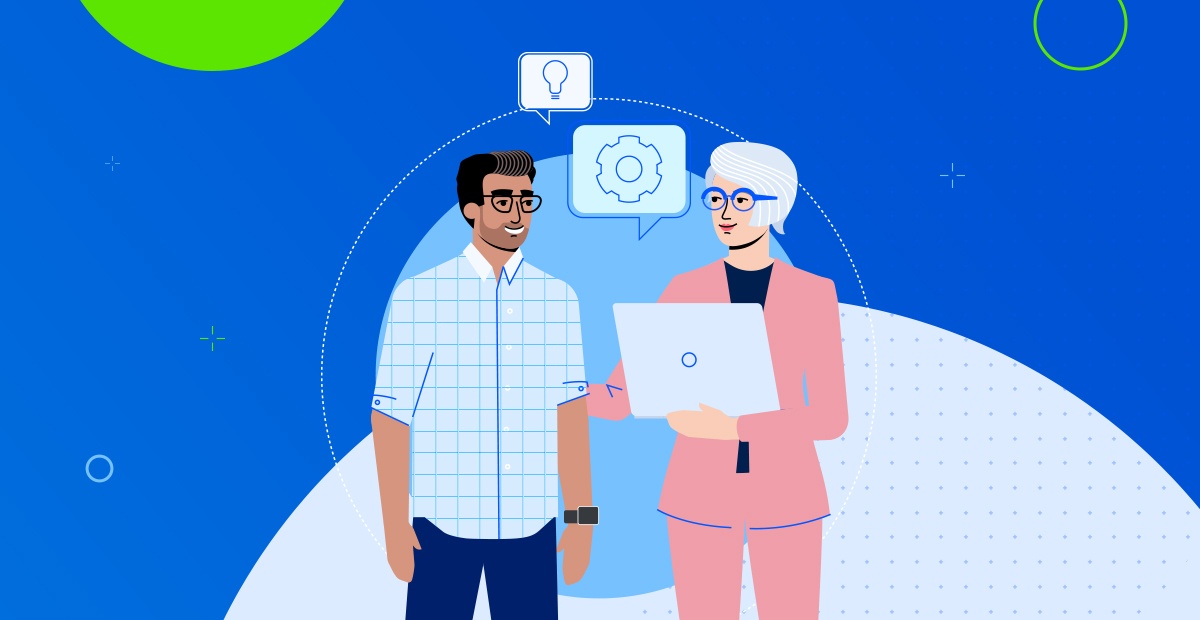Considering Mentorship: The Myths, the Reality and the Many Benefits

Mentorship can help the careers of both mentors and mentees. Learn more about the benefits of mentorship from Progress Board Directors.
Mentorship is one of my favorite topics. It has been such a meaningful development tool for me. Over the last eight years of my career, I’ve benefited from working with five formal mentors and many more informal ones. When I joined Progress, I was so happy to learn about our impactful Mentorship Program and am so proud to be a member of the Mentorship Committee, which has connected Progressers around the globe for four years.
To kick off this year’s Mentorship Program cohort, Daniela Dimitrova, Senior Director, Software Engineering, Progress, hosted a panel discussion with Progress Board Directors Angela Tucci, Rainer Gawlick and Vivian Vitale on the benefits of mentorship. I’ve summarized some of my favorite insights from the session below.
Who Can Mentor?
First off, the way we think about what mentorship is can make a big difference. Some of the personal stories our Board Directors shared opened my eyes to cast a wider net in terms of who I consider to be a mentor, because they can come in different shapes and sizes. For example, Vivian’s school teacher recognized her ability to communicate well and nurtured her skill in a way she found pivotal for her further development. Today, Vivian considers her gym coach to be a mentor of sorts who helps her stay disciplined. She now mentors an aspiring author alongside two other mentoring partners.
Why Mentor(ship)?
The panelists listed multiple benefits of mentorship that they experienced both personally and, more broadly, with the organizations they advise. Angela shared how mentorship opened doors for her in her career, and she was also able to advocate for a mentee later. Rainer spoke about an important lesson regarding diversity that he learned very early on from his research supervisor, who came from a different culture.
Cultural awareness was highlighted several times throughout the discussion as an invaluable insight to pick up via mentorship. A mentorship program provides a safe space to learn more on this topic, and both mentors and mentees can discover something new. Vivian also pointed out how mentorship can become a competitive advantage at the organizational level. When a company with long-tenured employees who know so much about their organization and products enrich each other’s knowledge via cross-functional matching, more people will understand different parts of the business.
Busting Some Mentorship Myths
Embarking on a mentorship journey can be very intimidating for potential mentors and mentees alike. Angela opened up about being struck with imposter syndrome the first time she was asked to mentor someone in finance, which she did not consider to be her area of expertise. By applying active listening, she was able to quickly figure out what her mentee needed, and it eventually turned into a lasting connection. In her words, we all “walk the planet uniquely” with a set of experiences that could be helpful to others, as long as we have the genuine desire to serve them.
On the other side, mentees can often be put off by seniority. In these cases, Rainer suggested mentees try to remember that leaders were once also high school students. This could shift mentees’ perspectives and make their mentors seem more accessible.
In either scenario, the perceived risk of trying mentorship is often not a real risk at all, according to Vivian. If one takes a leap of faith, they will get as much out of the experience as they are willing to give—and this is valid for both mentors and mentees.
What Makes a Good Mentor?
All panelists noted that trust is the core of an effective mentoring relationship. Vivian shared that both in her work and mentorship relations, she looks for people whose ethics and values she admires and who show kindness in their interactions. Rainer pointed out that our mentors do not need to be or become our best friends. Instead, we should look for someone we consider to be proficient in a skill or area we want to learn. Angela shared that she chose a mentor who seemed to be her exact opposite in almost every imaginable way, and yet this person ended up being in her support network for over 20 years. This goes to show that when it comes to mentorship, we should not seek our exact mirror images.
I felt so empowered by this discussion that I decided to apply as a mentor for the first time ever. I look forward to supporting other individuals the way I’ve been supported by fantastic mentors so far in my career. Mentorship can benefit anyone at any stage of their professional life—don’t wait to grow your network and career.

Milena Stoilova
Millie Stoilova is a culture enthusiast and experienced people professional with a passion for talent enablement and personal development. She is part of the People Team at Progress, where she currently manages the global employee engagement survey and leads various culture initiatives aiming to ensure Progress continues to be a great place to work. Outside of work, she is a vegetarian, reformer pilates practitioner, traveler and lover of all things beauty.
